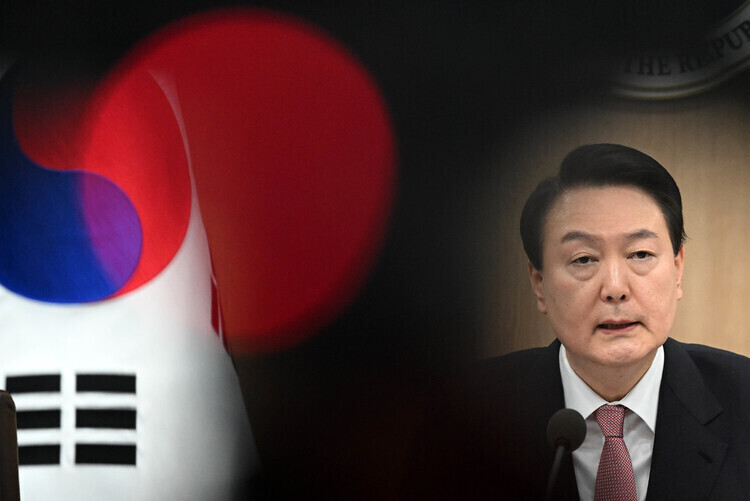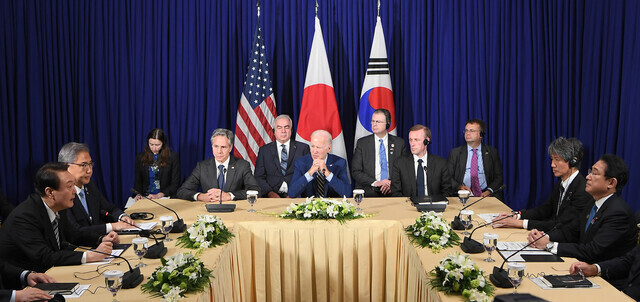hankyoreh
Links to other country sites 다른 나라 사이트 링크
Look where a year of Yoon’s “values diplomacy” has landed Korea

Since the early days of his administration, South Korean President Yoon Suk-yeol has proclaimed the importance of “values diplomacy,” with an emphasis on trilateral cooperation with the US and Japan.
But just under a year later, the response from Japan has been a diplomatic white paper omitting past references to “carrying on the historical perceptions of previous Cabinets.” From the US, it has been the interception of presidential office communications.
The national security situation, which the Yoon administration has cited as its top reason for pursuing trilateral cooperation, is also graver than ever before. Observers are now commenting on the comprehensive diplomatic disaster the administration has met with after emphasizing trilateral cooperation as its paramount value.
On Tuesday, Kim Tae-hyo, the National Security Office’s first deputy director, was asked what position Seoul planned to communicate to Washington in response to reports on a document containing circumstantial evidence that US intelligence agencies have been eavesdropping on the South Korean presidential office.
“There’s nothing to communicate,” he responded.
He went on to say, “The reason is that this was something someone fabricated. So the independent investigation is going to take some time.”
His remarks show that the government has fully accepted the position of the US, which hopes to turn attention away from the real meaning of the eavesdropping issue toward document fabrication allegations.
Meanwhile, Seoul continues to adopt a submissive stance in its diplomacy with Japan.
In a diplomatic blue book published the same day, the Japanese government omitted a reference to “carrying on the historical perceptions of previous Cabinets” on the issue of forced labor mobilization during the occupation.
Meeting with reporters, a South Korean Ministry of Foreign Affairs (MOFA) official insisted, “It’s still only been a month since the solution was announced, and we’re continuing to see good-faith measures from Japan.”
A MOFA spokesperson’s statement expressing a message of protest from the South Korean government over Japan’s diplomatic blue book included only content about the Dokdo islets — and nothing about the forced labor issue.
Since he was elected, Yoon has gone all in on stepping up trilateral cooperation with the US and Japan, while criticizing the balanced diplomacy approach of his predecessor Moon Jae-in.
Paying his first visit to a US military unit as president-elect on April 7 of last year, he reiterated his plans to prioritize the South Korea-US alliance. In a telephone conversation with Japanese Prime Minister Fumio Kishida on March 11 of last year — shortly after the election — he stressed the importance of trilateral cooperation and clearly signaled his intent to improve relations with Japan.
In response, the US and Japan have continued to present South Korea with bills to pay.
The Joe Biden administration overtly showed its protectionist “America first” orientation last year when it passed the Inflation Reduction Act, which excluded tax rebates for customers who purchase electric vehicles produced outside of North America. This decision had devastating consequences for the economic security of its ally South Korea.
Meanwhile, Japan has continued to parade its skewed historical perceptions.
The sixth-grade social studies textbooks unveiled by the Japanese Ministry of Education, Culture, Sports, Science and Technology on March 28 were even more watered down than past ones in their accounts of Japan’s coercive practices in conscripting Koreans and forcing them to perform labor. Textbooks for third to sixth graders in elementary school were made even more explicit in their unjustified claims of Dokdo being “Japanese territory” that is currently “illegally occupied by South Korea.”

In emphasizing his plans for trilateral cooperation with the US and Japan, Yoon has also drawn clear lines with respect to China and Russia. He spelled this out explicitly in a meeting with the US and Japanese leaders at an Association of Southeast Asian Nations summit on Nov. 13 of last year, where they announced the “Phnom Penh Statement on US – Japan – Republic of Korea Trilateral Partnership for the Indo-Pacific,” which targeted China and Russia simultaneously.
Yoon’s focus on trilateral cooperation has had damaging economic consequences. In the past, China was the partner with which South Korea had the largest trade surplus; now, it is turning into the largest trade deficit.
According to Korea International Trade Association trade statistics shared on March 28, South Korea’s balance of trade with China in January recorded a deficit of US$3.93 billion. The same month, China became the trade partner accounting for South Korea’s largest deficit.
In terms of the cumulative trade balance for January and Friday, China was also responsible for the largest trade deficit, amounting to US$5.07 billion. Never before has China been responsible for South Korea’s largest trade deficit in monthly or annual terms.
Meanwhile, North Korea has gone four days without answering regular calls on the military hotline and at the inter-Korean joint liaison office. The Korean Peninsula situation is spiraling into its worst-ever state. The Ministry of Unification has gone from talking about dialogue with the North during the Moon administration to playing a vanguard role in the hard-line attitude toward Pyongyang.
Experts are warning that if South Korea is the only party focusing on trilateral cooperation while the other countries are considering their own benefits and interests, it could find itself sidelined on the diplomatic stage.
“If we are going to cooperate with the US or Japan, then we need to analyze things carefully and benefit where we can,” said Kim Joon-hyung, former chancellor of the Korean National Diplomatic Academy.
“Instead, things are currently going in a direction of skewed cooperation where we’re losing out entirely in terms of practical benefits,” he added.
Choi Jong-kun, who formerly served as first vice foreign minister, said, “It seems like we’re jumping into trilateral cooperation with the US and Japan without defining for ourselves what that entails.”
“We’re talking about trilateral cooperation like it’s some kind of panacea, and now we’re just taking one hit after another,” he said.
By Shin Hyeong-cheol, staff reporter
Please direct questions or comments to [english@hani.co.kr]

Editorial・opinion
![[Editorial] Penalties for airing allegations against Korea’s first lady endanger free press [Editorial] Penalties for airing allegations against Korea’s first lady endanger free press](https://flexible.img.hani.co.kr/flexible/normal/500/300/imgdb/original/2024/0502/1817146398095106.jpg) [Editorial] Penalties for airing allegations against Korea’s first lady endanger free press
[Editorial] Penalties for airing allegations against Korea’s first lady endanger free press![[Editorial] Yoon must halt procurement of SM-3 interceptor missiles [Editorial] Yoon must halt procurement of SM-3 interceptor missiles](https://flexible.img.hani.co.kr/flexible/normal/500/300/imgdb/child/2024/0501/17145495551605_1717145495195344.jpg) [Editorial] Yoon must halt procurement of SM-3 interceptor missiles
[Editorial] Yoon must halt procurement of SM-3 interceptor missiles- [Guest essay] Maybe Korea’s rapid population decline is an opportunity, not a crisis
- [Column] Can Yoon steer diplomacy with Russia, China back on track?
- [Column] Season 2 of special prosecutor probe may be coming to Korea soon
- [Column] Park Geun-hye déjà vu in Yoon Suk-yeol
- [Editorial] New weight of N. Korea’s nuclear threats makes dialogue all the more urgent
- [Guest essay] The real reason Korea’s new right wants to dub Rhee a founding father
- [Column] ‘Choson’: Is it time we start referring to N. Korea in its own terms?
- [Editorial] Japan’s rewriting of history with Korea has gone too far
Most viewed articles
- 160% of young Koreans see no need to have kids after marriage
- 2Months and months of overdue wages are pushing migrant workers in Korea into debt
- 3Presidential office warns of veto in response to opposition passing special counsel probe act
- 4[Editorial] Penalties for airing allegations against Korea’s first lady endanger free press
- 5Hybe-Ador dispute shines light on pervasive issues behind K-pop’s tidy facade
- 6Historic court ruling recognizes Korean state culpability for massacre in Vietnam
- 7Japan says it’s not pressuring Naver to sell Line, but Korean insiders say otherwise
- 8Story of massacre victim’s court victory could open minds of Vietnamese to Korea, says documentarian
- 9Historic verdict on Korean culpability for Vietnam War massacres now available in English, Vietnames
- 10Bills for Itaewon crush inquiry, special counsel probe into Marine’s death pass National Assembly